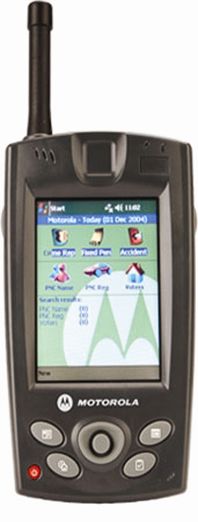PDAs and smart pens
Hand-held electronic notebooks are also to be issued to Durham Constabularys operational officers as the force launches experiments that herald the start of a hi-tech revolution.?
Hand-held electronic notebooks are also to be issued to Durham Constabularys operational officers as the force launches experiments that herald the start of a hi-tech revolution.?
A total of £160,000 has been set aside to buy BlackBerry-style computers that are initially set to go on trial in Darlington in the early summer.
At the same time Durham has bid for a share of the £50 million set aside by the Home Office and the NPIA to fund the introduction of a similar system nationwide.
The early summer launch in Darlington will initially be limited to just a dozen frontline officers. But if, as expected, the concept proves itself within a month, the rugged push-button Motorola computers will be distributed to a further 140 operational officers across the town as the trial is stepped up.
The PDAs will be linked to the national Airwave network. It will allow officers on the street to run an immediate first contact identification checks through the forces local intelligence system known as Memex as well as the quick address system and the police national computer.
Nationally the Home Office/NPIA blueprint hopes to be fully functioning ahead of the Olympics in 2012, enabling officers to take fingerprints in the street; give access to hundreds of thousands of mug shots held on a national database; and examine closed-circuit television images recorded at crime scenes.
Assistant Chief Officer Patrick Melia said the Darlington experiment was something the force had been working on for some time and linking into the Airwave system provided the key elements of security and liability.
The Home Office is offering a parallel system and wants to begin the roll-out across the country by September of this year by making 10,000 devices available. What we are doing gives us the opportunity to look at both ideas and make sure we get the one that best suits our officers and the way we work in Durham, said Mr Melia.
The forces radio network manager Steve Wright, who will be overseeing the trial, said the system was designed to cut down on frontline paperwork and bureaucracy.
The hi-tech notebooks will keep officers out on the streets for longer by cutting down on the need to go back to the police station to carry out routine checks, he said.
At the same time as the electronic notebooks are put to the test, crime-scene-investigators will be running the rule over another space-age time-saving tool digital pens with a built-in infra red camera.
The first ten smart pens costing a total of £10,000 will also be arriving in early summer and will be the subject of six months of scrutiny.
We know they work but we need to establish that theyre operationally effective before we commit ourselves to anything permanent, said Ron Richardson, the head of information systems and technology.
The robust pens, powered by a long-life battery, are a little more bulky than a fountain pen but allow users to hand-write reports and fill out a range of standard documents.
The camera within the pen identifies the form being filled out and copies up to 70 of the authors hand movements every second. When returned to its docking station the pen downloads stored data into the force computer system where it can be brought up on screen and converted into typed text at the push of a button.



